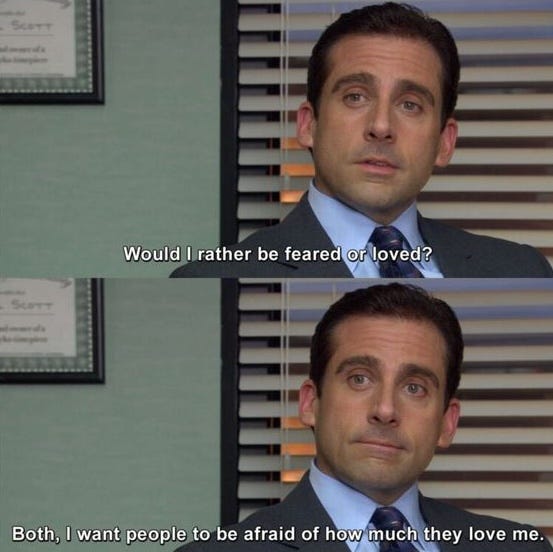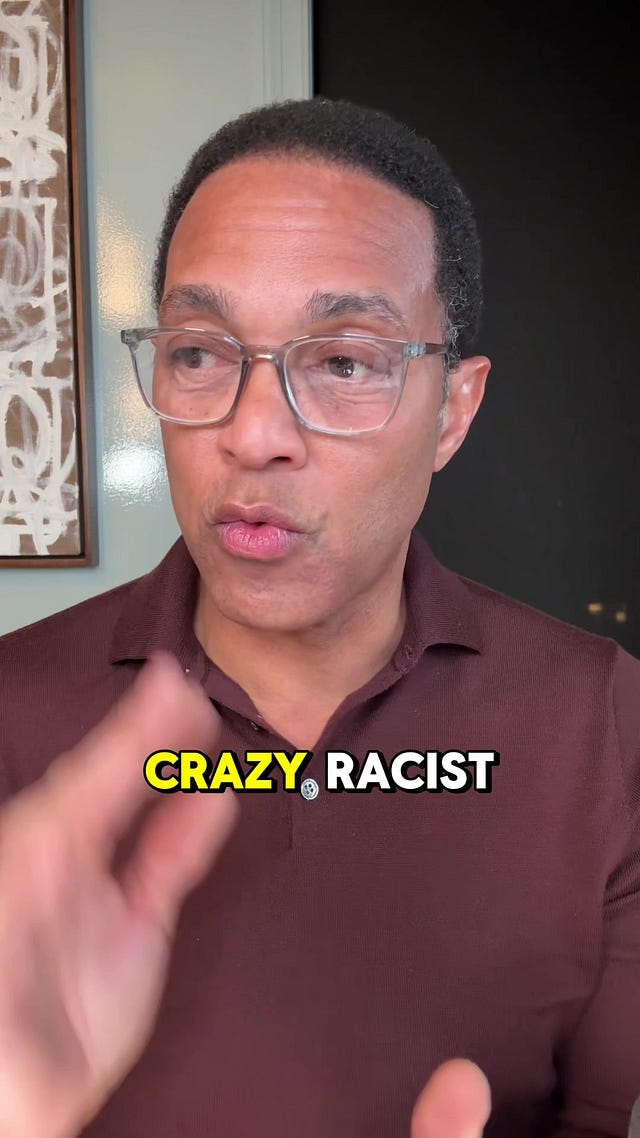I’ve had my dad’s number blocked for the past three years. Occasionally I’ll unblock it when my mom is unreachable, or when Mercury’s in retrograde and I’m feeling oddly generous. But for the most part, it stays where it belongs: behind a wall I pay T-Mobile to maintain.
The last time we spoke, really spoke, was at a family gathering (translation: social hostage situation where unresolved decades-long tensions marinate alongside short ribs). We were surrounded by people when my dad said: “Alina, we don’t have a relationship anymore. It’s so sad.”
I paused. The truth is, I hadn’t intentionally withdrawn, I’d just… stopped calling. After years of one-sided effort, I realized I didn’t want to keep performing daughterhood to an empty seat: someone who couldn’t remember my college major, let alone name my closest friend. So I rerouted everything through my mom (“Tell him I said hi!”) and went on with my life.
“You know the phone works both ways, right?” I asked.
He didn’t miss a beat: “I don’t call because our conversations are sooo boring.” There it was. The most honest sentence he’s ever said to me, and the most tragic. Seeing my deflation, he added: “You should ask more about me and my interests next time.” (My dad wanted a stage, and I’d failed as an audience member.)
At this point, aunties and uncles started chiming in like it was a town hall. “Why the hell would you make your kid talk about your interests?” “You’re supposed to ask about her!” “You’re a parent, act like one!!!” (Bless them.) Cornered, he mumbled something about it being a joke. (He always says he’s joking, a preemptive shield against accountability.)
An hour later, I lose a game of Mahjong. He sees his opening. Suddenly, I’m torn apart for missing a move that barely mattered, the insults growing more creative, cruel, and poetic in their intensity. It’s clear it isn’t about Mahjong anymore. (It’s revenge for earlier, for making him feel small.)
We fought, and maybe it was the way he smiled – satisfied, like watching a fire he lit burn – that made it click: this is what he lives for. Not tenderness, but the thrill of setting things off. I soon stopped mistaking noise for care, reaction for a relationship.
For years, I didn’t have the vocabulary for what he was, then therapy handed me a word like a flashlight in the dark: narcissist. Dealing with one is perturbedly hellish and hard to comprehend unless you’ve spent your childhood doing emotional gymnastics just to be acknowledged. You grow up whisper-screaming: “What should I do next? Tap dance? Juggle? Learn Pig Latin?!” When a parent casts themselves as the protagonist, and conversation is always a contest for airtime, your needs become trespass. You are denied something essential: the stability of being chosen over ego. That void doesn’t just ache, it erodes one’s entire sense of self.
Denial was my native tongue, and self-blame my second language. I carried it everywhere – the belief that if only I were more (interesting, impressive, loveable, etc.), maybe then I’d finally be worth seeing. Over time, I mastered triaging mood swings and modulating myself into something quieter, smaller, to keep the peace. Before I discovered who I was, I’d already been subconsciously trained to doubt myself and my reality.
To describe what it’s like dealing with a narcissist, I’ve compiled a list from personal experience and the r/narcissism Subreddit. (Note: Exhibiting these behaviors doesn’t automatically make someone a narcissist, but if someone’s narcissist, well, then… It’s like a rectangle-square situation).
Never confront narcissists about what they did or didn’t do. You’ll start with a perfectly valid point and then find yourself apologizing for something your dog did in 2010. They’re not there to resolve conflict, but rather, to contort it into a Mobius strip of semantics until you regret ever bringing it up. Narcissists don’t take accountability; at best, you’ll get “I’m sorry you feel that way.”
Narcissists require admiration like it’s life support, but the resume doesn’t always match the front. They overcompensate, terrified of being found out, and are not above spotlighting your insecurities just to keep the heat off theirs. If you hand them a secret, just know they’ll file it away like courtroom evidence, and weaponize it when they’re at their worst.
Narcissists genuinely believe they’re more special than everyone else, that the universe bends to their frequencies. They seethe when others succeed. They claim entitlement to your time and energy, while lacking the ability to see your perspective. “I was up till 4 AM overthinking. I can’t drive you,” the narcissist will declare, on the morning you have your wisdom tooth surgery.
But narcissists are not the enigmatic basement dwellers we sometimes imagine; no, they can be wildly charming, magnetic even. I’ve dated one. And while everyone around them is collateral damage, their partners take a direct hit.
The summer after high school, I was young and unsure of myself. Then he showed up: full of conviction, offering a path that seemed less murky. He said he had answers (He did not). I was gullible, then slowly, quietly exiled – told not to see friends or meet new people. He was a seasoned performer, using emotional theatrics to keep me close. When I dared to set a boundary, the show escalated, sometimes ending in a meltdown, other times an unannounced cameo at my doorstep. Once, he landed himself in the hospital just to prove a point. I absorbed it, thinking love meant holding space for destruction.
Eventually, something in me woke up. The promises of salvation were smoke. I was the scaffolding supporting him, on issues he was too cowardly to face himself. My autonomy threatened his control, masqueraded as care. Soon, he vanished, onto someone younger and more malleable. It’s a recognizable playbook now: preying on hope and dangling fantasy, just long enough to take what they need before moving on. I’ve since learned not to set myself on fire to keep someone like that warm.

The very unfortunate, annoying truth is that society has a kink for narcissists. They become our world leaders, CEOs, and red carpet regulars. Our systems reward those willing to exploit others to get ahead, and to opt out of narcissism can feel like relinquishing success. But narcissism doesn’t just sit at the top – it trickles down, seeps sideways and can settle into your everyday life: through the emotionally-stunted friend who hears “I’m going through the worst time” and responds with, “So, what do you think of my new hair?”; the co-worker who disappears during crunch time, then magically reappears to collect the praise for your team project. You leave the interactions feeling off-kilter and exhausted.
Narcissists don’t operate in a vacuum. They need enablers who cushion their behavior, excuse it, normalize it. Friends who shrug and say, “That’s just how he is.” Family units built around not rocking the boat, when the boat is clearly sinking. Once you spot the enablers, it becomes much easier to stop blaming yourself, and that clarity is the first step to liberation. (For every enabler’s “But he’s your dad! He could die tomorrow!” there is, “Cool, so could I! And so could any other human being on Earth”).
 Tiktok failed to load.
Tiktok failed to load.Enable 3rd party cookies or use another browser
The United States is currently under the administrative grip of a narcissist. To diagnose the condition is to lay bare the consequences borne by the populace. Trump isolates those vulnerably yearning for money, identity, purpose (often all three) and offers them the illusion of certainty, in exchange for something far more valuable: undying loyalty.

As a resident Gen Z, I’ve watched narcissism seep through a generation marked by deep isolation and a rapidly-dwindling capacity for empathy. Addicted to screens, we retreat into shells; filtered feeds like shrines to the self. Zoom meetings have us staring at our reflections more than the people we’re conversing with. This narrowed focus engenders narcissistic tendencies, making us prone to trading our energy for profit. People who rally behind figures like Trump often share a common truth: disregard for others that makes them easy prey for leaders who care no more for them than they do for anyone else.
Resisting narcissism requires you to log off and let your eyes adjust to natural light.
It requires performing quiet acts of kindness not for validation, but because they feel right. Sitting with strangers’ stories a moment longer than usual, then watching your empathy stretch and strengthen. Creating art, then detaching it from your ego. Letting your works exist without needing them to reflect back your worth. In doing so, you reclaim yourself from the spectacle, and perhaps begin to connect with something more genuine.








thank you so much for posting this, it made me feel seen and heard 💌 in a period where I need this the most (caught in the midst of untangling from a family dynamic with a narcissist and it's scary, frustrating and painful)
Thank you so much for writing this. Sometimes living with a narcissist feels like you’re completely alone in their circus. This post gave me so much comfort 💌🪽🌟